Search
Remove Ads
Advertisement
Summary 
Loading AI-generated summary based on World History Encyclopedia articles ...
Search Results

Image
Shichifukujin
The Shichifukujin or Seven Gods of Luck from Japanese folklore. From left to right: Daikoku, Bishamonten, Ebisu, Fukurokuju, Benzaiten, Hotei, Jurojin.

Definition
Seven Lucky Gods
In Japanese folklore the Shichifukujin are the Seven Lucky Gods who may also be known as the Seven Gods of Happiness or the Seven Gods of Good Fortune. The seven gods are in fact of diverse origin as some are originally from Buddhism, some...

Video
Seven Japanese Gods of Luck Festival (Shichifukujin) - Hatsu Konpira
At Kotohiragu Shrine a small shrine in Tokyo, they have a small festival with a small parade of the Shichifukujin, the Seven Lucky Gods of Japan. Hatsu Konpira is the shrine's first fair of the new year so the parade of the seven lucky gods...

Definition
Shinto
Shinto means 'way of the gods' and it is the oldest religion in Japan. Shinto's key concepts include purity, harmony, family respect, and subordination of the individual before the group. The faith has no founder or prophets and there is...
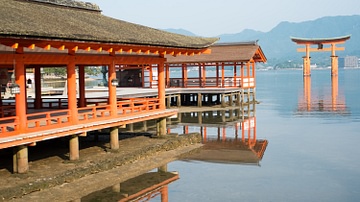
Definition
Itsukushima Shrine
Itsukushima Shrine is a Shinto shrine on the island of the same name, also known as Miyajima, located in Hatsukaichi, Hiroshima Prefecture, Japan. Traditionally founded in the 6th century CE, the present layout of buildings dates to the 12th...
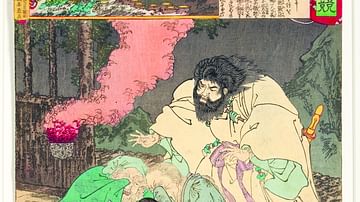
Definition
Susanoo
Take-haya-Susa-no-wo or Susanoo is the storm god of the Shinto religion. He is the younger brother of the sun goddess Amaterasu and infamous for his mischievous and sometimes destructive behaviour. Consequently, Susanoo has a reputation for...

Definition
Kami
In the Shinto religion kami is an all-embracing term which signifies gods, spirits, deified mortals, ancestors, natural phenomena, and supernatural powers. All of these kami can influence people's everyday lives and so they are worshipped...
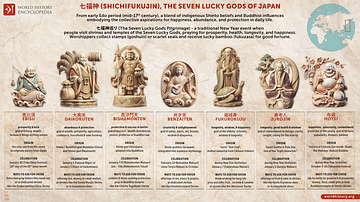
Image
The Seven Lucky Gods of Japan
An infographic about Shichifukujin, or the Seven Lucky Gods (Seven Gods of Fortune) of Japan, a revered group of deities associated with prosperity and good fortune. Each god represents different blessings, including wealth, happiness, and...
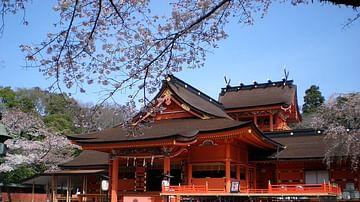
Definition
Shinto Architecture
The architecture of the 80,000 Shinto shrines in Japan varies depending on geographical location, the deity worshipped, and the date of foundation. The earlier Shinto shrines tend to be simpler and less decorative affairs than those which...
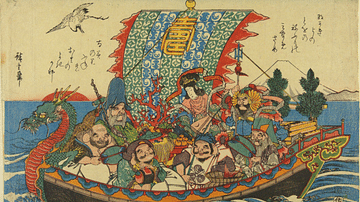
Image
Seven Lucky Gods on Takarabune
The Seven Lucky Gods (aka Shichifukujin) of Japanese folklore on their treasure ship or takarabune. By Hiroshige (1797-1858 CE). Woodblock print, c. 1840 CE. (Victoria & Albert Museum, London)